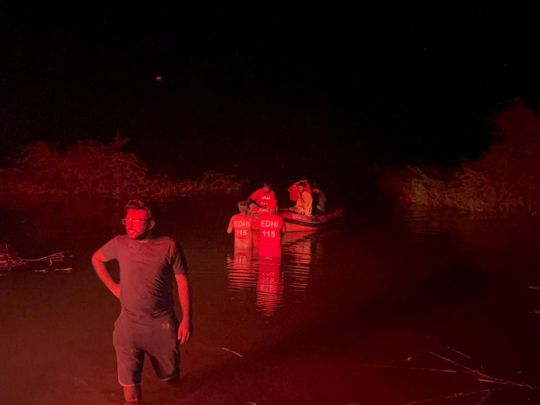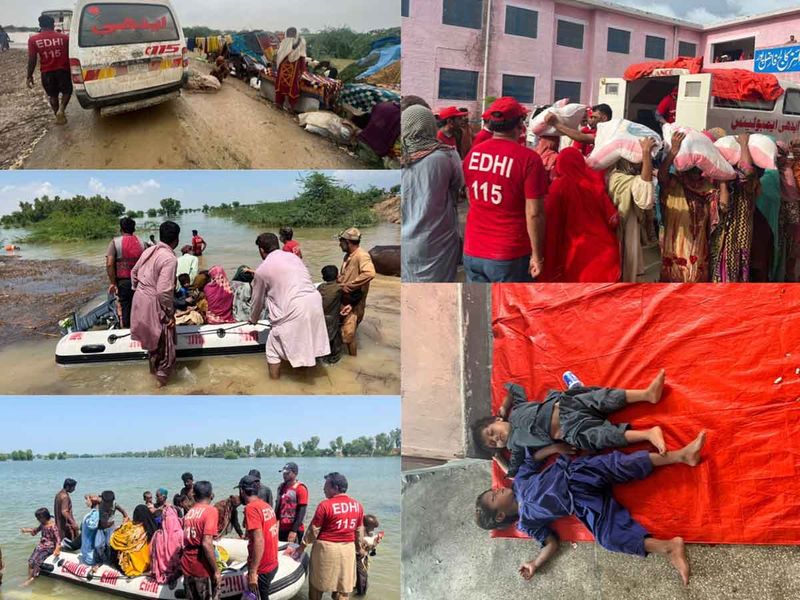
Pakistan’s 2022 floods. More than fifteen hundred humans are dead. More than five hundred children lost their lives. More than thirty-three million people are affected. More than 800,000 livestock are dead. More than two million acres of agricultural land is destroyed.
It will take years and billions of dollars to rebuild the flood-ravaged areas of Pakistan.
Before any official response, before any governmental assistance, before the availability of any state resources are those who stand in waist high water, walk through flooded lands, extend hands and aid, and act as the sole source of relief and barrier between a victim and their death. They are our national heroes. Pakistan’s social welfare organizations.
Amidst the unprecedented devastation of the 2022 monsoon floods, the ones who are in action without any consideration of personal safety, who respond even without being alerted, and who appear like angels wherever they are needed are the workers of the social welfare organizations of Pakistan, Edhi Foundation being one of the principal rescue-and-aid organizations helping people across Pakistan.
Edhi Foundation’s services touch every part of Pakistan. From roadside accidents to national catastrophes, personal funeral transportation to communal tragedies, regular emergency services to being the first responder in largescale disasters, Edhi ambulances and rescue teams are the nationwide icons of the nobility of serving humanity—selflessly, tirelessly, always.
Saad Edhi, operations head of the Edhi Foundation, is one of the thousands of social workers who only paused his rescue work last week when dengue and malaria, in a double attack, rendered him bedridden for a few days. Grandson of Abdul Sattar and Bilquis Edhi, Saad devotes every day of his life to serving humanity. That is the fundamental value his grandfather taught him with his work: help anyone in need, by any means.
Saad, in the last several weeks, with his team of sixty people and six boats, has saved more than one thousand people in the flood ravaged areas of Balochistan’s Lasbela, Uthal, Bela, and Naseerabad, and Sindh’s Sehwan, KN Shah Mehar, Shahdadkot, Larkana, and Dadu.
For Gulf News, I asked Saad Edhi of the Edhi Foundation a few questions:
Mehr Tarar: If you could put it in words, how would you describe the unimaginable devastation floods have unleashed in many parts of Sindh, and some parts of Balochistan, Khyber Pakhtunkhwa, and south Punjab in the last few months?
Saad Edhi: The 2022 floods have affected all provinces but Sindh in particular. Devastation in Sindh is too massive, I have never seen anything like this before. I was quite young during the 2010 floods but my father [Faisal Edhi], who was working at that time, tells me it wasn’t on this gigantic scale. Limited places were flooded. This time it’s everywhere.
One other problem is our lands have been destroyed, our crops have been destroyed. Crops that were cultivated, and the ones about to be cultivated, two crops have been affected. Floodwater will take three to four months to recede, and only then people will begin to resettle. It will take approximately a year for them to return to their homes, and start rebuilding their homes. They have zero funds now. It will take them at least five years for complete resettlement.
And that is only if in initial stages they are saved from famine and waterborne diseases. There will be huge problems in rehabilitation, the main reason being lack of financial resources. Pakistan government doesn’t have the funds to do much. Things could get really bad. Thousands of people could die because of famine and unavailability of medical assistance.

What was that one moment that truly broke you?
After roads and bridges were submerged, people were migrating from one village to another. Boats were being used in the process of migration. People were also travelling in private boats. There was this one incident, a boat carrying several people capsized. Fourteen-fifteen people died. Four people from one family, five people from another family, they all died at the same time. That was a very painful moment for me.
In search missions in our boats, we recovered their dead bodies. They were taken for their funerals in boats because their village was deluged. There was no road to get to their village, as most of the roads and bridges in flood affected areas are damaged. Water surrounded their village. Their dead bodies were transported from hospitals in boats.
Deaths of so many children. Why did so many children die?
Immune system of children is weak, and because of drinking rain and floodwater, they fall ill to many gastro diseases. When they don’t have access to clean drinking water or whatever little they have is consumed, they are forced to drink floodwater. Even when mixed with drinking or boiled water, its consumption leads to diarrhoea and other gastro issues.
The other thing is insufficiency of food, blood, and no roof to sleep under. All these things badly affect children.
The situation is indescribably bad. Too many deaths of children have also happened because when water rushes in with force and speed, people scramble to get out of their homes. Some of them get stuck; because of small children they can’t get out. Later, their homes are swamped, and all of them die.
Diseases are killing children. There is no medical assistance anywhere. If they do not receive medical assistance in a proper way, we fear hundreds of children and elderly won’t survive.
How are organisations —Edhi and others — helping the victims of flood?
During these floods, we are trying to work in four phases. The first phase was rescue. Second phase is distribution of ration; it would be great if food reaches as many people as possible. Starvation is imminent. Famine is imminent. NGOs must do as much as they can. We must fight this calamity collectively. But even collective efforts of all NGOs and government will not end this problem. The reason being the magnitude of this devastation is too big.
Third phase is medical assistance. Our medical camps have been set up in some places and will be established in others. Medicines are also in short supply. If import of medicines is opened for just two-three months, it will be very beneficial for victims of flood. Panadol, malaria medicines, gastro issues medicines are in very short supply in market, but prices have gone up four-five times. If short-term import is allowed, prices will go down, and everyone will be able to buy common medicines.
Fourth phase will be rehabilitation.
It is very tough to work on all these things. Other NGOs are doing their best too, but Pakistani NGOs are not that powerful that we can completely tackle this crisis or handle it very well on our own. Things are truly, truly bad. Pakistan government won’t be able to do it on its own. We don’t have the financial resources.
What are the governments — provincial and federal — doing to alleviate the agony of flood victims? What more should they be doing?
Right now, provincial and federal governments do not have the required financial resources. COVID-19 worsened issues, followed by recession in Pakistan. Gradually, we came out of that stage, but Pakistan even now does not have the funds to deal with the scale of these floods. If we don’t get foreign aid, there will be more destruction, the consequences of which are unquantifiable.
What are the micro and macro steps essential for immediate and long-term assistance and rehabilitation of millions of people affected by floods?
For rehabilitation, we truly need the international community. If they don’t help us, our assets—be they in human or financial or livestock form—will continue to be badly affected.
Deaths are too many, and not even properly recorded. When water dries up and government machinery is working hundred percent, only then we will have the accurate number of deaths.
Pakistan has almost zero contribution to climate change. We have minimum contribution, but we are one of the biggest victims of climate change. The real culprits are the big powers that in their industrialization processes have played a major role in causing climate change. If they don’t help us, we will suffer huge losses. They should help because what has happened is because of them. We are not to be blamed. Climate change is because of these countries, and international community must look towards us and help us in this terrible time. We need the world to stand with us.
But so far, none of the major contributors to climate change have sent us any substantial aid. One country’s few planeloads of rations don’t even support for long even one district. More help is required. Climate change is because of them, and when it is time to give aid to the biggest victims of climate change, they should contribute with generosity, and do it substantially and consistently.










